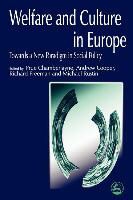En savoir plus
Comparing European welfare regimes at local, national and international levels, Welfare and Culture in Europe stresses the need for a concept of culture to be incorporated into welfare studies. The book analyses the theoretic issues behind the emergence of the concept of culture in welfare during a time of crisis and change in Europe. Part II concerns administrative arrangements for welfare provision and how practitioners and users respond to them. Chapters highlight how different key social concepts such as the nature of citizenship, the role of the family and the public/private dichotomy shape the provision and use of welfare services. The final part develops possible directions for future policy research and presents alternative methodological bases for empirical work. It includes a major quantitative study of the ways in which welfare states reflect and reproduce patterns of social values, and a description of a new technique of biographical analysis of welfare users.Welfare and Culture in Europe proposes a redirection of social policy in welfare, moving away from the limitations of the traditional, universal, bureaucratic politics of distribution to a 'post-modern' participatory and innovative politics of recognition.
Table des matières
Introduction - the problematization of welfare as culture, Richard Freeman et al. Part 1 Welfare, culture and social change: education, welfare and nationhood in Europe, Walter Lorenz; Sweden - the traumatic dismantling of welfare in a model welfare culture, Martin Peterson; globalization and the subjectivity of professional social workers, Steven Trevillion; money, care and consumption - families in the mixed economy of social care, John Baldock and Clare Ungerson. Part 2 Welfare, culture and practice: public and private relations of welfare in East and West Germany, Annette King and Prue Chamberlayne; getting help and having rights - parents' experiences of child welfare in England and France, Rachel Hetherington; anxiety and child protection work in two national systems, Andrew Cooper; economic and cultural dimensions of the dualism of poverty in Italy, Antonella Spano. Part 3 Welfare, culture and social theory: questions of criticism -Habermas and Foucault on civil society and the welfare state, Samantha Ashenden; psychosocial characteristics of welfare, Mike Rustin; European families of nations and value patterns, Michael Hornsby-Smith and Michael Proctor; biography and social polocy, Prue Chamberlayne; conclusion - welfare, culture and policy in Europe, Andrew Cooper.
A propos de l'auteur
Prue Chamberlayne is Director of the Centre for Biography in Social Policy at the University of East London. Andrew Cooper is Professor of Social Work at the Tavistock Clinic and University of East London. Richard Freeman is Lecturer in European Policy and Politics at the Department of Policy, University of Edinburgh. Michael Rustin is Professor of Sociology at the University of East London.
Résumé
This book describes how an awareness of culture must be applied to the study and provision of welfare in Europe. It shows how the cultures underpinning social welfare systems are starting to be exposed and explored. The assumption that the values and beliefs which constitute welfare systems are universal and absolute has been overturned.

